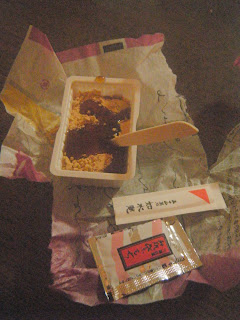At parent-teacher conferences, a student gave me a gift box from Josuian, and I completely regret that I did not photograph the box in its original form before unpacking, because it was beautiful. Packaging in Japan is a big deal, sometimes to the point of hilarity. A mundane box of crackers here can be like one of those prank birthday party gifts that starts out the size of a suitcase and ends up containing a pair of stud earrings. Aesthetic, yes. Ecologically friendly, not so much.
First item in the box: 曲水の詩, Kyoukusui no uta, translated by Google Translate as "Poetry meandering stream." I can't do much better, except that it's probably the other way around: "The Meandering Stream's Poetry."
(See what I mean about the packaging?)

Basically, it's a sweet gelatin with a hint of plum. The texture is not as scary as it looks - it melts on your tongue. Sort of like a lighter, flakier Jell-O, without the synthetic aftertaste. Justin totally dug it.

Next, "天王光", tennou kou. "Tennou light," according to Google; with my mad Chinese character recollection skillz, I produce "Light of the Heavenly King/King of Heaven." Due to the lantern-shaped packaging?

Red bean paste around real roasted chestnut.

I looooove roasted chestnut. If I were a Heavenly King, I would definitely eat these. Well, actually, the red bean paste wasn't amazing, so I'd probably just eat the chestnuts, and as far as I'm concerned they can hold the packaging, too. I am always looking for ways to save Heavenly Taxpayer money.
[Update: "Tenno" is the term for the Japanese emperor. Live and learn!]
Finally, 筑紫もち or "Tsukushi mochi," unhelpfully translated by Google as "Tsukushi rice Aoyagi."
 Also more packaging.
Also more packaging.
 Also more packaging.
Also more packaging.
Let's see what I can do for you on the name. "Mochi" is a rice cake. This particular character 紫 pronounced "shi" means "violet" if you read it by itself. Tsuku, on the other hand... I had to try 3 different online dictionaries to even get a definition. This one tells me it's an old musical instrument. On the other hand, if we read them as one word "Tsukushi," Wikipedia turns up "Tsukushi" as an archaic name for Kyushu, the island we now live on. I have also turned up English web sites showing "Tsukushigata" as the name for the dark purple Japanese maple, but I haven't been able to find any kanji (characters) to confirm that it would be the "right" Tsukushi. (Japanese has lots of homophones - words with the same pronunciation but completely different meanings, reflected in the characters the way we show it by writing "pear" and "pair").
After eating, though, I am leaning towards the "maple" translation as the correct one. That little packet in the photo above contains maple syrup, to be drizzled like so according to the pamphlet that came in the candy box:
The other little packet contained a toothpick-type skewer - mochi are normally finger foods but this one would clearly gunk up your fingers. As for the taste? It's a weird concept but it kind of works.

In any case, it beats an American "apple for the teacher!"







complicated snackfoods! Japan is such an adventure.
ReplyDelete